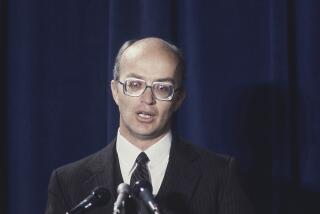The Great Mismatch : H. Ross Perot Violated GM Bureaucracy’s Code by Public Criticism
- Share via
NEW YORK — Like no other corporate executive in America, enterprising H. Ross Perot presided over his company like a general. His troops are as disciplined as those of any army, adhering to strict codes of dress and conduct.
So the irony of the circumstances leading to Perot’s ouster from the General Motors board of directors Monday is inescapable: He violated GM’s code of honor.
“GM, more than any other organization, likes to deal with things in a private setting,” observed longtime GM watcher David Cole, director of the University of Michigan’s Office for the Study of Automotive Transportation. “They are very tough on themselves internally. They want their directors and consultants to bring the whips and chains and be direct and brutal.
“But you don’t take those criticisms outside. Ross never learned that.”
From the day in the summer of 1984 when General Motors said it was buying Perot’s Electronic Data Systems, with its vastly different corporate style, EDS founder Perot has been a thorn in GM’s side.
The former IBM supersalesman, who founded EDS with $1,000 in 1962, has repeatedly likened his role with GM to teaching an elephant to tap dance. He has cajoled GM executives for dragging their feet on planned organizational changes and for being out of touch with workers and customers. And he has blasted the company as inefficient, top-heavy and mired in bureaucracy.
“The first EDS’er to see a snake kills it,” he is fond of telling reporters. “At GM, first thing you do is organize a committee on snakes. Then you bring in a consultant who knows a lot about snakes. Third thing you do is talk about it for a year.”
So different was his concept of running a company from that of GM executives, in fact, that many industry observers wrote off the unlikely marriage as doomed from the start. GM employees bristled at the EDS dress and conduct codes (e.g., no beards and no alcohol at lunch) and its informal, performance-oriented way of doing business. And EDS staffers smirked at GM employees’ do-it-by-committee approach.
“You couldn’t find two companies more diverse in management style,” James P. Buchanan, EDS manager of finance and administration, told a reporter last year.
But for two years, Perot’s vocal criticisms won GM Chairman Roger B. Smith’s tolerance and bemusement--if not his blessing.
If GM was to restore competitive fervor inside the company, Smith has said repeatedly, it had to behave more like an entrepreneur. Perot’s prodding was a constant reminder of that.
“GM’s top executives were intrigued by his self-imposed role as house critic. I think they wanted to learn from him,” Rosabeth Moss Kanter, a Harvard University professor and sometime GM management consultant, said Monday.
But in recent months, seemingly out of growing frustration over GM’s eroding profits and market share, Perot had become increasingly strident in his attacks on the company--both inside the board room and to public audiences. GM directors even took the unusual step several months ago of warning him to tone down his criticism.
‘He Overstepped’
“There is a very strong sense of what constitutes polite behavior at that company and he overstepped it,” Kanter asserted. “It was like he was taking on the rescue from Iran all over again. Only there, he was taking some strong actions. Here, he was just being an irritant.”
(Her reference is to the 56-year-old Perot’s daring rescue in 1979 of EDS employees held hostage in Iran.)
Perot once intervened on behalf of one GM worker who could not get his job back after being laid off. He campaigned against the closing of a GM assembly plant in his home state of Texas. He launched a one-man search for solutions to GM’s problems, crisscrossing the country for meetings with GM dealers, assembly-line workers, managers and industry analysts.
But what ultimately triggered what GM is calling “his termination,” was “taking his case to the media,” said Harvey Heinbach, an auto industry analyst with Merrill Lynch.
To one reporter, Perot said: “We’ve got to nuke the GM system.” And to another: “You’ve got to move Roger (Smith) and the rest of those people out of the 14th floor of the GM building and down to the real places where people are doing the real work of building cars.”
Smith has brought more changes to GM than anyone since the late Alfred P. Sloan Jr., the chairman whose decentralized management system helped build the company. Nevertheless, Smith has not quenched Perot’s thirst for fast and dramatic. But the showdown between the GM 30-year veteran and the Texas billionaire has left GM’s Smith less angry than frustrated over the long-term consequences.
“This sends a very bad message throughout the ranks,” Kanter observed. “People are going to wonder ‘What happens if I speak up?’ ”
Another cause for concern is the effect of Perot’s departure on the continued meshing of the two corporate cultures.
Insiders said that while there is still friction between the two camps, there is also strong evidence that they are blending better than many predicted.
“GM is much more entrepreneurial than it was and much more responsive than it was and Ross Perot has to get a lot of the credit for that,” Cole said.






